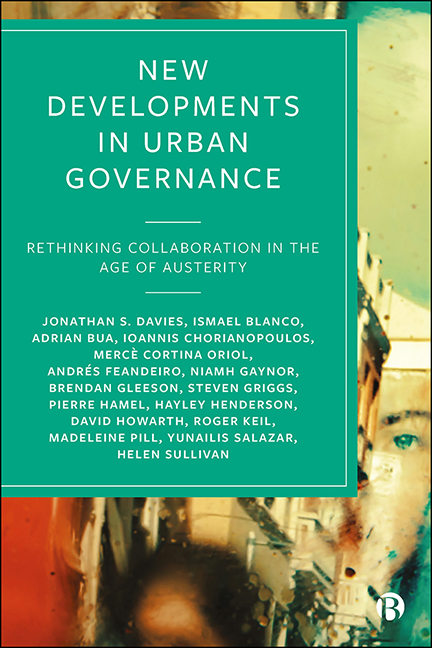Book contents
- Frontmatter
- Contents
- List of Figures and Tables
- Acknowledgements
- Introduction
- 1 Crisis and Austerity in Eight Cities: An Overview
- 2 Collaborative Governance After the Global Economic Crisis
- 3 Austerity Governance, Political Resistance and Urban Transformation
- 4 Rescaling through Austerity Governance
- 5 The Local State in Austerity Governance
- 6 Urban Cultural Diversity and Economic Migration in Austere Times
- 7 Conclusion
- Afterword: From Austerity to COVID-19 and Beyond
- Notes
- References
- Bibliography of Working Papers
- Index
6 - Urban Cultural Diversity and Economic Migration in Austere Times
Published online by Cambridge University Press: 15 September 2022
- Frontmatter
- Contents
- List of Figures and Tables
- Acknowledgements
- Introduction
- 1 Crisis and Austerity in Eight Cities: An Overview
- 2 Collaborative Governance After the Global Economic Crisis
- 3 Austerity Governance, Political Resistance and Urban Transformation
- 4 Rescaling through Austerity Governance
- 5 The Local State in Austerity Governance
- 6 Urban Cultural Diversity and Economic Migration in Austere Times
- 7 Conclusion
- Afterword: From Austerity to COVID-19 and Beyond
- Notes
- References
- Bibliography of Working Papers
- Index
Summary
Introduction
Economic migration flows, accelerated by globalization, have substantially increased the cultural and ethnic diversity of Western societies with high GDP economies. As a large part of these migration flows are motivated by the aspirations of those living in the Global South, or the majority world, to improve their living conditions in more economically prosperous countries, the result in the host societies is not only a substantial increase in ethnic and cultural diversity, but also greater social challenges in accommodating difference as well as the policy challenges of addressing socio-spatial inequalities that already exist in cities. The rapid growth of inwards migration not only poses a formidable challenge from the point of view of intercultural relations, but also for the social and spatial cohesion of the destination societies. The resulting inequalities add to the racialized geographies of the early 21st century in many Western countries. The different kinds of migrants coming from the Global South – labour migrants, refugees, asylum seekers – and the places in which they concentrate, together with the local disadvantage created by histories of racism and colonialism of the last century, are amongst the most vulnerable to the dynamics of social marginalization and stigma. These dynamics have been exacerbated in many Western cities since the 2008 Global Economic Crisis (GEC) and the introduction of austerity policies discussed throughout the book.
This chapter discusses the way that (neoliberal) austerity has impacted social, racial and cultural inequalities and the ability of collaboration to support more inclusive democratic cities or resist exclusions. The basic premise is that cities play a fundamental role in the dynamics of social inclusion or exclusion of economic migrants and other racial and ethnic minorities, and in the way that societies cope with the challenge of recognizing and accommodating cultural diversity. This is due to at least three phenomena: first, cities are the places where the vast majority of the newcomers settle and where the greatest cultural and racial diversity can be found; second, cities concentrate a wide array of services and infrastructures and are the site of policy that creates or removes opportunity for the social inclusion of migrants and minorities – for example schools, social services, health and community centres, sport and cultural facilities, parks and squares, urban revitalization, public transport or migrant settlement services;
- Type
- Chapter
- Information
- New Developments in Urban GovernanceRethinking Collaboration in the Age of Austerity, pp. 107 - 125Publisher: Bristol University PressPrint publication year: 2022



